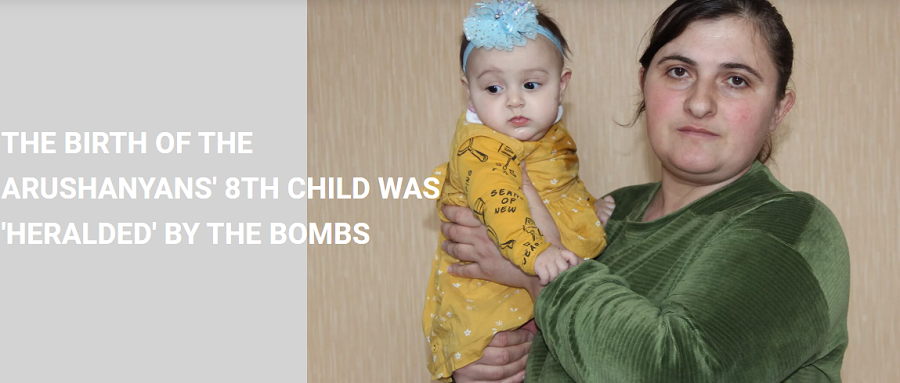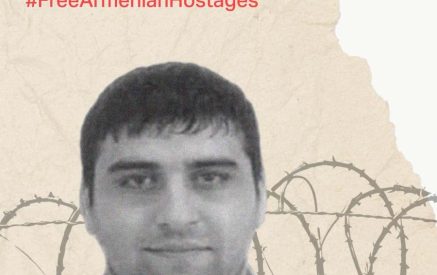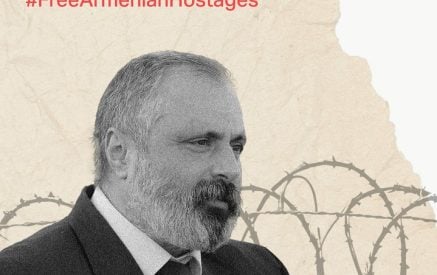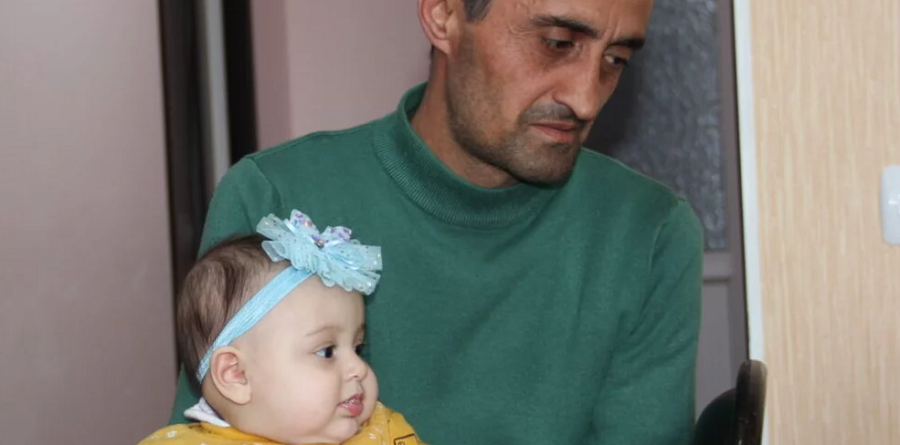AFTER THE HEAVY CONDITIONS OF THE BLOCKADE, THE DISPLACEMENT ROAD WAS A NEW ORDEAL FOR THE PREGNANT WOMEN
Sergey, Inna, Arsen, Nver, Alex, Mane, Rita, Eva; these are Marine Arushanyan’s eight children, the oldest is 16 years old, and the youngest–only 5 months.
After reaching Stepanakert from the village of Vank, Marine was taken to the hospital, but the doctors, lacking available beds, redirected her to the municipal building. The pains did not stop. At dawn, she was taken back to the hospital, and Eva was born.
Read also
Eva was born a month early. The reason was her mother’s fear and anxiety. On September 19, 2023, five of Marine’s children were at school, one in kindergarten. During the explosions they all found each other and went into the forest to spend the night along with their fellow villagers. Marine’s eldest son was already living in Stepanakert–the capital city.
Later, when the situation calmed down a bit, Marine and her eldest daughter took the five children and boarded a bus to Stepanakert. Meanwhile, Marine sent her husband to retrieve their documents from home.
- Read translation: Marine Arushanyan recounts
- The children were at school, one was in kindergarten. My eldest daughter called, saying, “Mom, the fighting is starting.” The children came from school, my eldest daughter took the little one from the kindergarten, and we went into the forest. We thought we would go to Yerevan for maybe a couple of days, then return to Artsakh; not realizing it was already the end. We spent a night in the forest in Vank village. Then in the morning we were transported to Stepanakert by cars and buses. We went to the municipal building, spent the evening there, and on the morning of September 20, my pains started. I was ready that I might have my baby on the road.
There was a severe shortage of beds in the city hospital. Parents with children who needed less care were quickly discharged.
Marine never imagined that there would be no return. She thought she would come back to her native Vank in a few days. They left unprepared and half-dressed, just to escape.
Marine started the displacement journey with seven children, and later the newborn Eva joined them.
She has particularly painful memories from the Hakari checkpoint, where the Azerbaijanis threatened and mocked them, took the men out of the car, and interrogated them.
- Read translation: Marine Arushanyan recounts
They told us to leave, they gathered us in buses and we left. On the way, the turks [Azerbaijanis] approached us, they took the children out, looked at them, didn’t ask us anything. I kept silent out of fear, didn’t say a word. I thought they might approach; who knows what they would do? When they talked, we panicked. The children were watching, crying. They took the men out, talked to them a bit. When they gave us water in bottles and laughed a little at the children, while throwing the bottles at them, we felt bad and humiliated.
The family reached Vaik and then Gyumri a day later. They lived in a camp for five days. Then in a hotel for a month, after which the hotel owner asked them to vacate the room. Now the family is renting an apartment in Gyumri. They still cannot come to terms with losing their homeland.
The children find it difficult to attend school, yearning for their home and the school in their village. But Marine is satisfied with the school; the children are treated well, registered in various clubs, fed, and attempts are made to help them recover from their shocks and painful experiences.
24-year-old Lusine married in Chartar a month after the start of the blockade. During her pregnancy, she struggled with the lack of food; they could not even get bread in the last months. There was no fuel, the visits to the hospitals in Martuni or Stepanakert were for extreme cases only.
“I knew there wasn’t much to eat, so I restrained myself. When we found out it was a boy, we were very happy. I felt he was going to be a strong boy, so my husband and I decided to name him David.
David was born amid gunfire and shelling. Lusine spent two days in a basement with fellow villagers. The men were defending the village positions; the road to Stepanakert was already controlled by the Azerbaijanis.
The enemy had never been so close, they almost reached the village. In those self-defense battles, Chartar lost 10 people. Lusine clearly heard the gunshots and explosions from the basement. She will never forget how worried she was about her unborn child.
Lusine’s doctor, Gohar Tonyan, somehow managed to get in touch from Martuni. She requested that Lusine go to the Martuni hospital immediately after the firing stopped. The child had to be delivered by C-section.
On September 22, Lusine’s husband, Samvel, found fuel and drove her to Martuni. In the hospital basement, there were wounded soldiers and civilians, without medicine or necessary conditions. Under the sounds of their screams, Lusine’s son and another Chartar woman’s–Arpine’s daughter, were born.
“Arpine was from the Ghuze district of Chartar. Hers was a girl, mine was a boy. We were in uncertainty, we didn’t know what would happen. Even though my husband was there, I was still anxious. You could hear explosions very close to the hospital.
The way home was unusual, with the 3-kilogram David in her arms. Lusine did not yet know that in a few days they would leave their native Chartar.
David Grigoryan was only five days old when he, wrapped in a hospital blanket, traveled the displacement road with his parents. David’s place of birth is listed as Martuni on his certificate.
Only in Yerevan did the Sargsyan family find out that the Azerbaijanis entered the town less than an hour after they had left.
Lusine often dreams of her family home, of their Chartar.
Authors: Anjela Stepanyan, Zaruhi Tonikyan, Shushan Papazyan, Astghik Hovhannesovz


























































